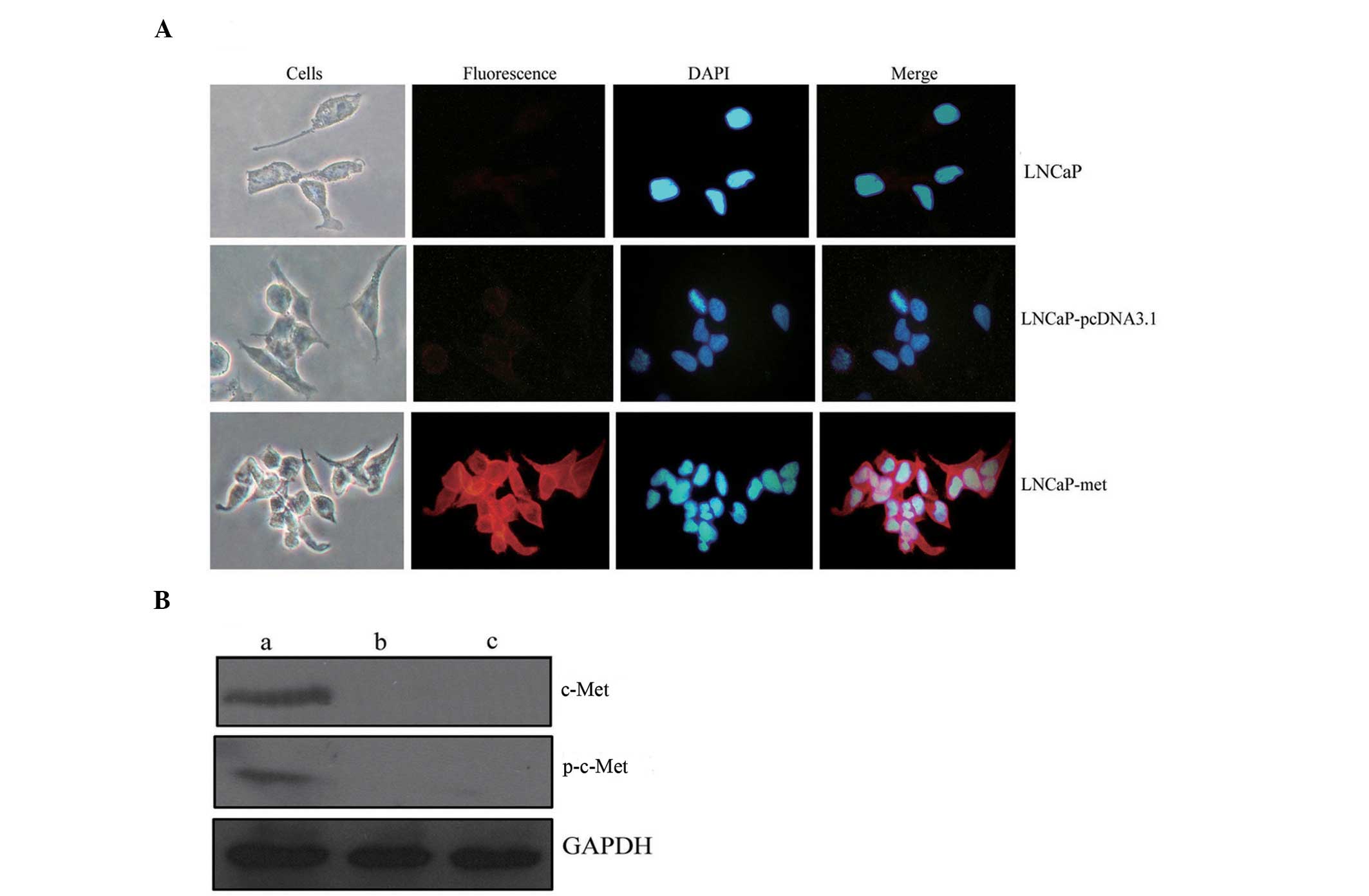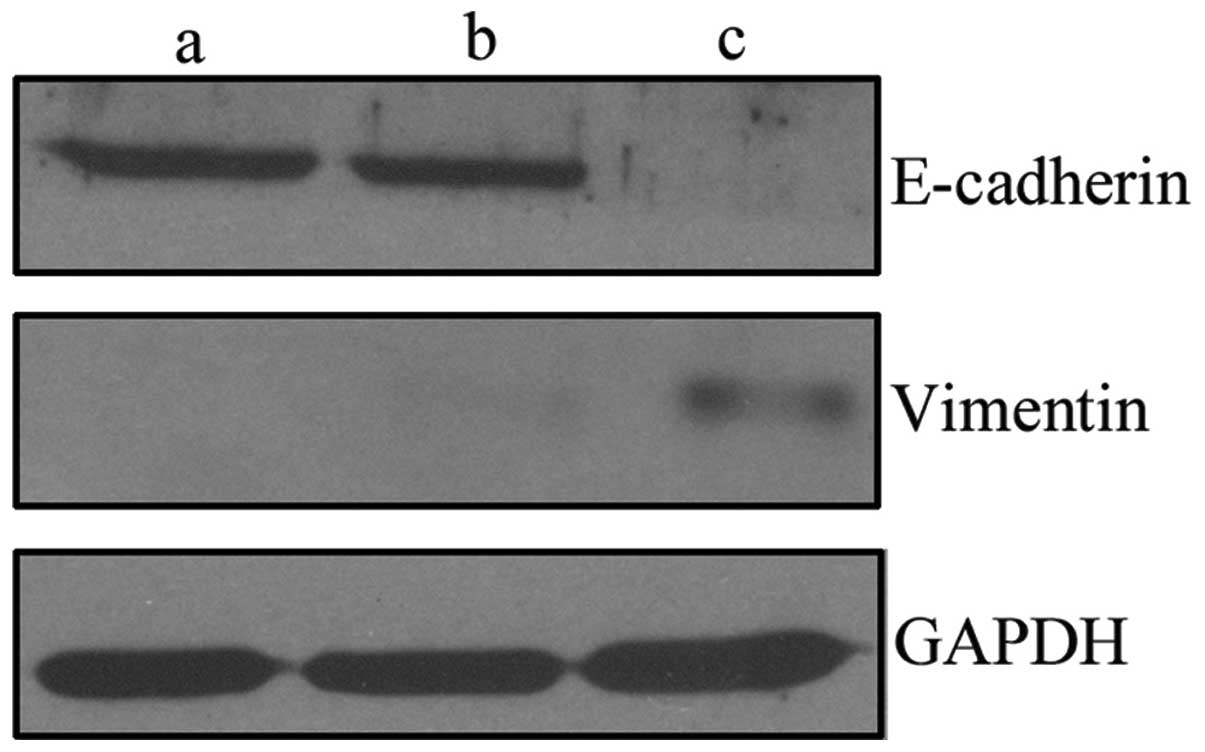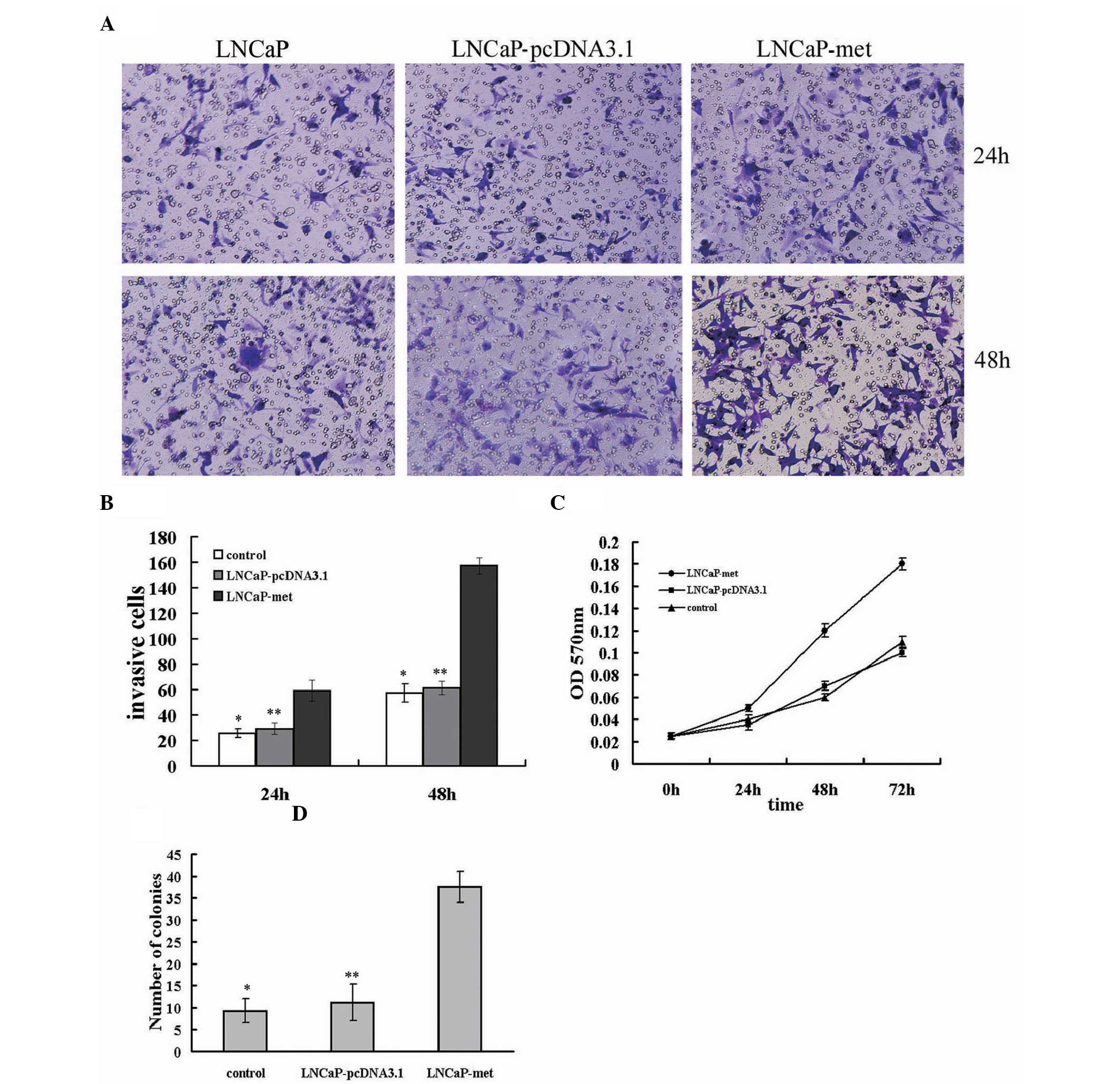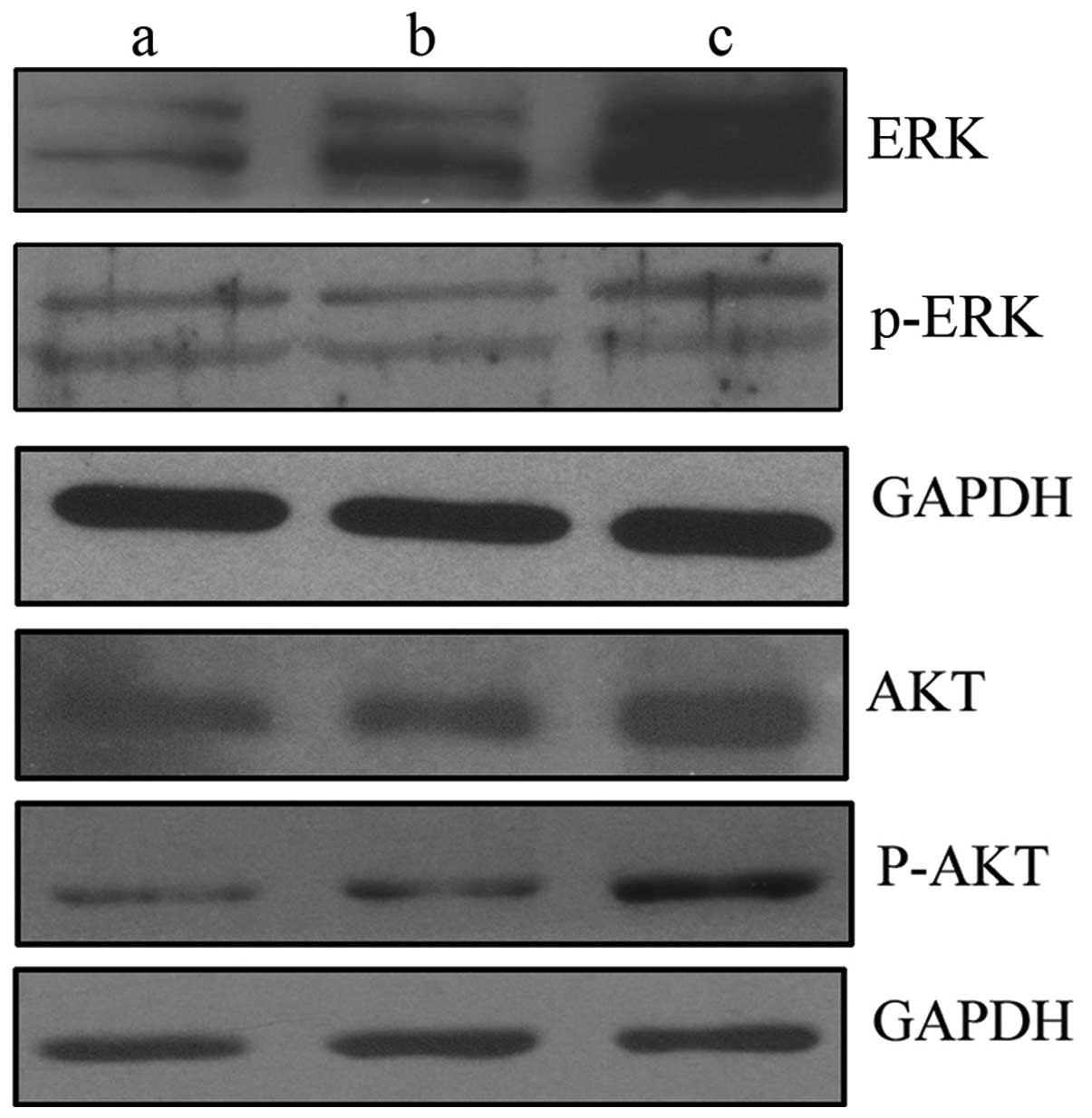|
1
|
Jeffers M, Rong S and Vande Woude GF:
Enhanced tumorigenicity and invasion-metastasis by hepatocyte
growth factor/scatter factor-met signaling in human cells
concomitant with induction of the urokinase proteolysis network.
Mol Cell Biol. 16:1115–1125. 1996.
|
|
2
|
Ponzetto C, Bardelli A, Zhen Z, et al: A
multifunctional docking site mediates signaling and transformation
by the hepatocyte growth factor/scatter factor receptor family.
Cell. 77:261–271. 1994.
|
|
3
|
Birchmeier C and Gherardi E: Developmental
roles of HGF/SF and its receptor, the c-Met tyrosine kinase. Trends
Cell Biol. 8:404–410. 1998.
|
|
4
|
Bhardwaj V, Cascone T, Cortez MA, et al:
Modulation of c-Met signaling and cellular sensitivity to
radiation: potential implications for therapy. Cancer.
119:1768–1775. 2013.
|
|
5
|
Gibney GT, Aziz SA, Camp RL, et al: c-Met
is a prognostic marker and potential therapeutic target in clear
cell renal cell carcinoma. Ann Oncol. 24:343–349. 2013.
|
|
6
|
Knudsen BS and Vande Woude G: Showering
c-Met dependent cancers with drugs. Curr Opin Genet Dev. 18:87–96.
2008.
|
|
7
|
De Bacco F, Luraghi P, Medico E, et al:
Induction of MET by ionizing radiation and its role in
radioresistance and invasive growth of cancer. J Natl Cancer Inst.
103:645–661. 2011.
|
|
8
|
Qian LW, Mizumoto K, Inadome N, et al:
Radiation stimulates HGF receptor/c-Met expression that leads to
amplifying cellular response to HGF stimulation via upregulated
receptor tyrosine phosphorylation and MAP kinase activity in
pancreatic cancer cells. Int J Cancer. 104:542–549. 2003.
|
|
9
|
Graveel CR, Tolbert D and Vande Woude GF:
MET: a critical player in tumorigenesis and therapeutic target.
Cold Spring Harb Perspect Biol. 5:a0092092013.
|
|
10
|
Luraghi P, Schelter F, Krüger A and
Boccacciol C: The MET oncogene as a therapeutical target in cancer
invasive growth. Front Pharmacol. 3:1642012.
|
|
11
|
Feng Y, Thiagarajan PS and Ma PC: MET
signaling: novel targeted inhibition and its clinical development
in lung cancer. J Thorac Oncol. 7:459–467. 2012.
|
|
12
|
Li B, Torossian A, Sun Y, Du R, Dicker AP
and Lu B: Higher levels of c-Met expression and phosphorylation
identify cell lines with increased sensitivity to AMG-458, a novel
selective c-Met inhibitor with radiosensitizing effects. Int J
Radiat Oncol Biol Phys. 84:e525–e531. 2012.
|
|
13
|
Seiden-Long I, Navab R, Shih W, et al:
Gab1 but not Grb2 mediates tumor progression in Met overexpressing
colorectal cancer cells. Carcinogenesis. 29:647–655. 2008.
|
|
14
|
Chung JY, Davis JA, Price BD, et al:
Competitive enhancement of HGF-induced epithelial scattering by
accessory growth factors. Exp Cell Res. 317:307–318. 2011.
|
|
15
|
Ogunwobi OO and Liu C: Hepatocyte growth
factor upregulation promotes carcinogenesis and
epithelial-mesenchymal transition in hepatocellular carcinoma via
Akt and COX-2 pathway. Clin Exp Metastasis. 28:721–731. 2011.
|
|
16
|
Previdi S, Maroni P, Matteucci E, Broggini
M, Bendinelli P and Desiderio MA: Interaction between human-breast
cancer metastasis and bone microenvironment through activated
hepatocyte growth factor/Met and β-catenin/Wnt pathways. Eur J
Cancer. 46:1679–1691. 2010.
|
|
17
|
Pisters LL, Troncoso P, Zhau HE, Li W, von
Eschenbach AC and Chung LW: c-met proto-oncogene expression in
benign and malignant human prostate tissues. J Urol. 154:293–298.
1995.
|
|
18
|
Cecchi F, Rabe DC and Bottaro DP:
Targeting the HGF/Met signaling pathway in cancer. Eur J Cancer.
46:1260–1270. 2010.
|
|
19
|
Luo Y, He DL and Ning L: Expression of
‘epithelial-mesenchymal transition’ associated proteins in prostate
cancer cell lines with different metastatic potentials and its
significance. Zhonghua Nan Ke Xue. 12:696–700. 2006.(In
Chinese).
|
|
20
|
McKeithen D, Graham T, Chung LW and
Odero-Marah V: Snail transcription factor regulates neuroendocrine
differentiation in LNCaP prostate cancer cells. Prostate.
70:982–992. 2010.
|
|
21
|
Wang Y, Yue D, Li K, Liu YL, Ren CS and
Wang P: The role of TRPC6 in HGF-induced cell proliferation of
human prostate cancer DU145 and PC3 cells. Asian J Androl.
12:841–852. 2010.
|
|
22
|
Tate A, Isotani S, Bradley MJ, Sikes RA,
Davis R, Chung LW and Edlund M: Met-independent hepatocyte growth
factor-mediated regulation of cell adhesion in human prostate
cancer cells. BMC Cancer. 6:1972006.
|
|
23
|
Książkiewicz M, Markiewicz A and Zaczek
AJ: Epithelial-mesenchymal transition: a hallmark in metastasis
formation linking circulating tumor cells and cancer stem cells.
Pathobiology. 79:195–208. 2012.
|
|
24
|
Voutsadakis IA: The ubiquitin-proteasome
system and signal transduction pathways regulating Epithelial
Mesenchymal transition of cancer. J Biomed Sci. 19:672012.
|
|
25
|
Matsuoka J, Yashiro M, Doi Y, et al:
Hypoxia stimulates the EMT of gastric cancer cells through
autocrine TGFβ signaling. PLoS One. 8:e623102013.
|
|
26
|
Luo Y, He DL, Ning L, et al:
Over-expression of hypoxia-inducible factor-1α increases the
invasive potency of LNCaP cells in vitro. BJU Int. 98:1315–1319.
2006.
|
|
27
|
Lamouille S, Subramanyam D, Blelloch R and
Derynck R: Regulation of epithelial-mesenchymal and
mesenchymal-epithelial transitions by microRNAs. Curr Opin Cell
Biol. 25:200–207. 2013.
|
|
28
|
Davidson B, Tropé B and Reich R:
Epithelial-mesenchymal transition in ovarian carcinoma. Front
Oncol. 2:332012.
|
|
29
|
Hamada S, Satoh K, Masamune A and
Shimosegawa T: Regulators of epithelial mesenchymal transition in
pancreatic cancer. Front Physiol. 3:2542012.
|
|
30
|
Talbot LJ, Bhattacharya SD and Kuo PC:
Epithelial-mesenchymal transition, the tumor microenvironment, and
metastatic behavior of epithelial malignancies. Int J Biochem Mol
Biol. 3:117–136. 2012.
|
|
31
|
Leopold PL, Vincent J and Wang H: A
comparison of epithelial-to-mesenchymal transition and
re-epithelialization. Semin Cancer Biol. 22:471–483. 2012.
|
|
32
|
Navab R, Liu J, Seiden-Long I, et al:
Co-overexpression of Met and hepatocyte growth factor promotes
systemic metastasis in NCI-H460 non-small cell lung carcinoma
cells. Neoplasia. 11:1292–1300. 2009.
|
|
33
|
Garnett J, Chumbalkar V, Vaillant B, et
al: Regulation of HGF expression by ΔEGFR-mediated c-Met activation
in glioblastoma cells. Neoplasia. 15:73–84. 2013.
|
|
34
|
Varkaris A, Gaur S, Parikh NU, et al:
Ligand-independent activation of MET through IGF-1/IGF-1R
signaling. Int J Cancer. 133:1536–1546. 2013.
|
|
35
|
Nurwidya F, Takahashi F, Murakami A and
Takahashi K: Epithelial mesenchymal transition in drug resistance
and metastasis of lung cancer. Cancer Res Treat. 44:151–156.
2012.
|
|
36
|
Shimada S, Mimata A, Sekine M, et al:
Synergistic tumour suppressor activity of E-cadherin and p53 in a
conditional mouse model for metastatic diffuse-type gastric cancer.
Gut. 61:344–353. 2012.
|
|
37
|
Jahn SC, Law ME, Corsino PE, et al: An in
vivo model of epithelial to mesenchymal transition reveals a
mitogenic switch. Cancer Lett. 326:183–190. 2012.
|
|
38
|
Martin TA, Mason MD and Jiang WG:
Hepatocyte growth factor signaling in cancer metastasis. Curr
Signal Transduct Ther. 6:180–190. 2011.
|
|
39
|
Thiery JP, Acloque H, Huang RY and Nieto
A: Epithelial-mesenchymal transitions in development and disease.
Cell. 139:871–890. 2009.
|
|
40
|
Gentile A, Trusolino L and Comoglio PM:
The Met tyrosine kinase receptor in development and cancer. Cancer
Metastasis Rev. 27:85–94. 2008.
|
|
41
|
Birchmeier C, Birchmeier W, Gherardi E and
Vande Woude GF: Met, metastasis, motility and more. Nat Rev Mol
Cell Biol. 4:915–925. 2003.
|
|
42
|
Benvenuti S and Comoglio PM: The MET
receptor tyrosine kinase in invasion and metastasis. J Cell
Physiol. 213:316–325. 2007.
|
|
43
|
Torres KE, Zhu QS, Bill K, et al:
Activated MET is a molecular prognosticator and potential
therapeutic target for malignant peripheral nerve sheath tumors.
Clin Cancer Res. 17:3943–3955. 2011.
|
|
44
|
Lengyel E, Prechtel D, Resau JH, et al:
C-Met overexpression in node-positive breast cancer identifies
patients with poor clinical outcome independent of Her2/neu. Int J
Cancer. 113:678–682. 2005.
|
|
45
|
Zhou AX, Toylu A, Nallapalli RK, et al:
Filamin a mediates HGF/c-MET signaling in tumor cell migration. Int
J Cancer. 128:839–846. 2011.
|
|
46
|
Inagaki Y, Qi F, Gao J, et al: Effect of
c-Met inhibitor SU11274 on hepatocellular carcinoma cell growth.
Biosci Trends. 5:52–56. 2011.
|
|
47
|
Falchook GS, Fu S, Amin HM, et al: Phase I
dose-escalation study of the oral selective C-Met inhibitor EMD
1204831 in patients with advanced solid tumours. Eur J Cancer.
47:S1582011.
|
|
48
|
Yap TA, Olmos D, Brunetto AT, et al: Phase
I trial of a selective c-MET inhibitor ARQ 197 incorporating proof
of mechanism pharmacodynamic studies. J Clin Oncol. 29:1271–1279.
2011.
|



















